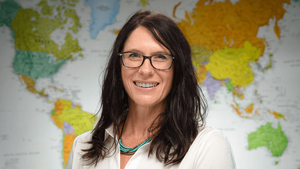ND Energy Faculty Luncheon Seminar: "Building Community Resilience: Practical Lessons for a Changing Climate" by Tracy Kijewski-Correa
Please join ND Energy for the Spring Faculty Luncheon Seminar Series focused on specific research topics with talks by Notre Dame faculty, followed by an inspiring and stimulating exchange of ideas, while exploring new directions for cross-collaborations. All interested faculty are welcome to attend.

This month, we are delighted to feature a talk by Tracy Kijewski-Correa, titled "Building Community Resilience: Practical Lessons for a Changing Climate" on Thursday, February 29, at 12:30 p.m. in B01 McCourtney Hall. Please RSVP to the Google calendar invitation by 9:00 a.m. Tuesday, February 27, to help us prepare for enough lunches. If you did not receive an invitation or have questions about the seminar, please contact Dr. Subhash L. Shinde, ND Energy Associate Director.
View Recap of Major Points Here
Abstract
Losses that result from climate-related disasters are increasing worldwide. Even when emergency management and early warning systems are successful in limiting loss of life, these disasters cause displacement and trauma, disrupting livelihoods, education, and healthcare delivery. Not only are low-probability, high-consequence weather events becoming more frequent and intense, but the losses from commonly-occurring, lower-intensity events like seasonal floods are also mounting. Contending with these rapid-onset climate hazards will require proactively building resilience and critically examining the implications of our development choices. This lecture will explore these issues against the backdrop of a changing climate, presenting a series of lessons from the field of disaster risk reduction that can guide how we build community resilience. These lessons emphasize the importance of investing in the systems that enable markets to promote resilient practices at scale, messaging co-benefits today that achieve a more resilient tomorrow. These lessons further reiterate how our frames of reference and the tools that guide development decisions will need to become more future-focused, requiring advances in how we predict and communicate evolving climate risks. There is no doubt that these risks will demand even greater investments in our communities, but these lessons further reinforce that by embracing and innovating local solutions using local capacity and partnerships, we can discover more cost-effective strategies to broadly enhance resilience. The lecture will close with a candid conversation regarding the limits of "engineering" resilience and the need to allow controlled failures to avoid catastrophic losses and eventual retreat in just and equitable ways.
Biography
Tracy Kijewski-Correa is the William J. Pulte Director of the Pulte Institute for Global Development in the Keough School of Global Affairs at the University of Notre Dame, where she also serves as co-Director of the School’s Integration Lab (i-Lab). As a professor of Civil Engineering and Global Affairs, jointly appointed in the Department of Civil and Environmental Engineering & Earth Sciences, she is a faculty fellow at a number of Notre Dame institutes including the Kellogg Institute for International Studies, Fitzgerald Institute for Real Estate, and Environmental Change Initiative, while also serving as a member of the Executive Committee of the Technical Activities Division of the Structural Engineering Institute of the American Society of Civil Engineers.
Her research is dedicated to enhancing the resilience and sustainability of hazard-exposed communities, with an emphasis on conceiving holistic responses to infrastructure vulnerabilities and tools that support science-informed decision making by diverse stakeholders. She currently serves as the inaugural director of the National Science Foundation’s (NSF) Structural Extreme Event Reconnaissance (StEER) network, assessing the impacts of major hazard events using advances in data science. Leveraging these and other open data sources, she is similarly leading the development of regional simulation tools for hurricane risk assessment through the Natural Hazards Engineering Research Infrastructure (NHERI) Computational Simulation Center (SimCenter). Her interdisciplinary work further explores how to effectively integrate field observations, simulations and experiments to advance coastal policy and practice, including participating in the design of a National Full-Scale Testing Infrastructure for Community Hardening in Extreme Wind, Surge, and Wave Events (NICHE), a major research infrastructure to experimentally simulate impacts of climatological hazards and mitigation solutions for frontline communities. This work complements her ongoing efforts to study the uptake of mitigation guidance for self-recovery from disasters across the United States and around the world, most recently through her work in Lake Charles, LA funded under NSF's Strengthening American Infrastructure program and service on the National Academies of Science Engineering and Medicine consensus study on Compounding Disasters in Gulf Coast Communities, 2020-2021. This work builds on her active involvement in the recovery following multiple disasters in Haiti, including the most recent earthquake in 2021.
Her contributions have been recognized by awards from the American Society of Civil Engineering, American Political Science Association, Institution of Civil Engineers, International Association for Wind Engineering, and American Association for Wind Engineering. Kijewski-Correa is formally trained as a Civil Engineer with a specialization in Structural Engineering, earning her Bachelor of Science, Master of Science, and PhD from the University of Notre Dame.